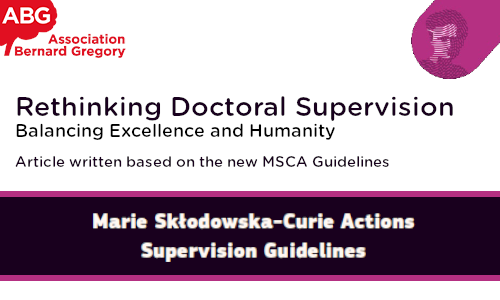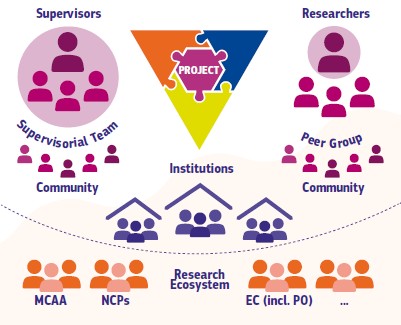Rethinking Doctoral Supervision: Balancing Excellence and Humanity – The 2025 MSCA Guidelines
The Marie Skłodowska-Curie Actions (MSCA), the European Union’s flagship programme for researcher training and mobility, support thousands of scientists around the world every year. In January 2025, the European Commission revised its supervision guidelines, following a consultation process launched during the 2024 MCAA Conference in Milan, to better guide doctoral and postdoctoral supervision practices.
ABG shares these key updates and provides its critical analysis to shed light on this essential issue for research and innovation.

Main innovations in the 2025 Guidelines
The ABG approach: a concrete extension of the MSCA Guidelines
ABG training on supervision & European projects
Professionalize supervision within your organization
The revised document of the MSCA Supervision Guidelines does not constitute a regulation per se, but rather an evolving reference framework of good practices. It reflects a continuous improvement approach, built upon the experience and feedback of the wide network of researchers and supervisors involved in the Marie Skłodowska-Curie Actions and the MCAA.
While these guidelines do not create formal obligations, they nonetheless define a credible and influential benchmark to which any actor involved in doctoral or postdoctoral training would benefit from comparing themselves.
Main innovations in the 2025 Guidelines
 The major conceptual innovation lies in the formalization of a structured “supervision ecosystem” built around a dynamic triangle:
The major conceptual innovation lies in the formalization of a structured “supervision ecosystem” built around a dynamic triangle:
- Supervisors: responsible for scientific supervision and professional development
- Researchers: active beneficiaries of training and mentoring
- Institutions: guarantors of frameworks, resources, and structural support
This ecosystem is enriched by an extended network including the Marie Curie Alumni Association (MCAA), National Contact Points (NCPs), REA Project Officers, and all academic and non-academic organizations.
The 2025 Guidelines give a prominent place to shared supervision models:
These models take different forms: intra-institutional co-supervision involving several supervisors within the same organization, joint inter-institutional supervision promoting collaboration between institutions, and intersectoral supervision creating bridges between academia and industry — a model exemplified by the French doctorat CIFRE.
These approaches aim to:
- distribute the supervision workload;
- diversify perspectives and networks;
- prepare researchers for varied career paths;
- ensure continuity of supervision. Frameworks include supervision structures (guidelines, agreements, model contracts), formal onboarding processes (information access, integration into networks), conflict resolution mechanisms (transparent, confidential and impartial procedures), as well as continuous evaluation systems (satisfaction surveys, effectiveness tracking, continuous improvement).
The ABG approach: a concrete extension of the MSCA Guidelines
For several years, ABG has supported research actors in the professionalization of doctoral supervision. Its approach, based on field experience, complements and operationalizes the recommendations of the Marie Skłodowska-Curie Actions (MSCA).
Both initiatives share a common vision: promoting supervision excellence centered on relationship quality and researcher development. ABG adds a pragmatic and managerial dimension, essential to putting these principles into everyday practice.
Co-constructing the supervisory relationship
The MSCA Guidelines emphasize the need for alignment of expectations between supervisors and researchers. ABG turns this into a method: from day one, it encourages the co-construction of the doctoral project vision, where the doctoral candidate becomes an active player in their own trajectory.
Integrating management fundamentals
ABG considers supervision as a specific managerial relationship, based on responsibility and communication.
Its training programs rely on:
- team management principles adapted to the doctoral context,
- progressive development of autonomy,
- and prevention of critical situations through practical tools.
This approach brings to life what the MSCA Guidelines state: demanding yet humane supervision.
Welcoming, integrating, and fostering research culture
The European Guidelines highlight the importance of structured onboarding for doctoral candidates; ABG complements this with a human and intercultural dimension. The first year is seen as a key period to build trust, transmit laboratory codes, and establish a shared culture rooted in mutual respect. It also emphasizes the importance of quality recruitment. Supervisors are encouraged to become familiar with interview techniques and identifying high-potential profiles. Recruiting a doctoral candidate means identifying a future research collaborator.
Critical analysis by ABG – Dr. Vincent Mignotte
ABG emphasizes that successful supervision does not rely solely on institutional compliance, but on a balance between guidance and autonomy.
According to Dr. Vincent Mignotte, Training and Support Manager for Senior Researchers at ABG:
“The new MSCA Guidelines indeed provide a rigorous framework for doctoral supervision; however, the doctoral candidate is a young professional, and as such, bears part of the responsibility for the quality of the relationship with their supervisors. The document could have addressed this point in greater depth. ABG decided to tackle it through a dedicated training course for doctoral candidates entitled Bien vivre son doctorat, conceived as the mirror of the program for supervisors. What truly matters is the ability of both supervisors and doctoral candidates to exchange on their mutual expectations and to build a climate of reciprocal trust.”
Thus, the doctoral candidate should be viewed as a co-actor in their own training, demonstrating curiosity, creativity, initiative, responsibility, and perseverance.
1 - Value mutual commitment: clarify expectations for proactivity, curiosity, and accountability from the doctoral candidate.
2 - Contextualize the guidelines: adapt recommendations to disciplinary and sector-specific realities.
3 - Foster progressive autonomy: structure supervision according to a decreasing gradient of dependency.
4 - Recognize reciprocity: emphasize the mutual benefits of the supervisory relationship.
ABG training & European projects
ABG offers specialized training sessions on doctoral supervision designed to meet both European requirements and real-world needs. Designed and delivered by former researchers and supervisors with international experience, these sessions are based on the principles of the European Charter for Researchers and on the MSCA Guidelines (Marie Skłodowska-Curie Actions).
Participants appreciate...
Now I have tools.”
not only for doctoral candidates — that made it very useful.”
now I understand why.”
I particularly appreciated the diversity of profiles (Michelin, CNRS, medicine).”
... As do European organizations!
ABG’s training sessions are highly valued by participants — who find them practical and impactful — and by institutions, which recognize their strategic value and regularly entrust ABG with implementing such sessions.
Recent examples of collaborations with European projects and key research actors include:
- COFUND EuReCa Project, coordinated by Institut Curie: one-day doctoral supervision training offered to three cohorts of supervisors (link)
- Team-up for Startup #HealthTech event, coordinated by Institut Pasteur: project pitch session (3 minutes each, focused on clearly expressing development-stage needs to ease networking between participants and startups) (link)
- EUTOPIA project, coordinated by CY Cergy Paris Université (link): online half-day workshop entitled Introduction to team management, focused on the fundamentals of team leadership and preparing postdoctoral researchers for supervisory roles.
Discover more examples of European collaborations with ABG
Professionalize supervision within your organization with ABG
For over 10 years, ABG has supported the upskilling of supervisors, playing a recognized leading role in the professionalization and monitoring of doctoral supervision in France and Europe. This expertise translates into tailored training programs, built upon a deep understanding of both academic and industrial contexts.
Companies, research institutes, universities, foundations and other organizations wishing to professionalize their supervisors can benefit from:
- Tailor-made training: sessions adapted to your organizational context;
- On-site delivery: we train your teams directly on your premises;
- Long-term support: post-training follow-up and in-depth coaching.
Contact us to organize a session
BONUS TRACK: The success story – [Michelin x ABG] Supervisors Training
Since 2023, the Michelin Group has been collaborating with ABG to jointly train the doctoral supervisors of its industrial teams together with academic researchers from the Auvergne Rhône-Alpes region.
This unique training fosters experience sharing and harmonization of practices between academic and industrial research environments, to the benefit of successful CIFRE doctoral projects.
Watch the cross-testimonies of participants and project leaders in the video below, which perfectly illustrates the spirit of innovation and collaboration fostered by ABG.
 To go further...
To go further...
-
Marie Skłodowska-Curie Actions guidelines on supervision: https://europa.eu/!j6Hbdd
-
Marie Skłodowska-Curie Actions – Supervision guidelines: annex with best practices: https://europa.eu/!k94F3n
- Social media posts: MSCA’s LinkedIn
- ABG Supervision training: www.abg.asso.fr/formations
- Marie Curie Alumni Association: www.mariecuriealumni.eu
Article written by the ABG Editorial Team – Association Bernard Gregory
For any questions, contact ABG
- Dr Sandra Giron: Head of Innovative Training and Support Unit – sandra.giron@abg.asso.fr
- Dr Vincent Mignotte: Training and support for senior researchers – vincent.mignotte@abg.asso.fr
- Dr Felisa Berenguer: Training and Support Manager – felisa.berenguer@abg.asso.fr
Find out more
Collaborate with ABG for your European project
ABG has been increasingly active at the European level and is recognized as "Euraxess Career Development Center" since 2017. It is a partner in several European projects (COFUND, Doctoral Networks, Interreg, Erasmus, etc.). Discover our actions in favor of the recruitment and career development of researchers and associate ABG to your projects.
The call for projects MSCA Cofund and Doctoral Networks are respectively open until June 23rd, and between May 28th and November 25th, 2025.
Get ABG’s monthly newsletters including news, job offers, grants & fellowships and a selection of relevant events…
Discover our members
 ANRT
ANRT  SUEZ
SUEZ  Nantes Université
Nantes Université  Medicen Paris Region
Medicen Paris Region  Servier
Servier  Ifremer
Ifremer  TotalEnergies
TotalEnergies  ASNR - Autorité de sûreté nucléaire et de radioprotection - Siège
ASNR - Autorité de sûreté nucléaire et de radioprotection - Siège  Institut Sup'biotech de Paris
Institut Sup'biotech de Paris  Groupe AFNOR - Association française de normalisation
Groupe AFNOR - Association française de normalisation  ADEME
ADEME  Laboratoire National de Métrologie et d'Essais - LNE
Laboratoire National de Métrologie et d'Essais - LNE  Nokia Bell Labs France
Nokia Bell Labs France  Généthon
Généthon  ONERA - The French Aerospace Lab
ONERA - The French Aerospace Lab  Tecknowmetrix
Tecknowmetrix  Aérocentre, Pôle d'excellence régional
Aérocentre, Pôle d'excellence régional
